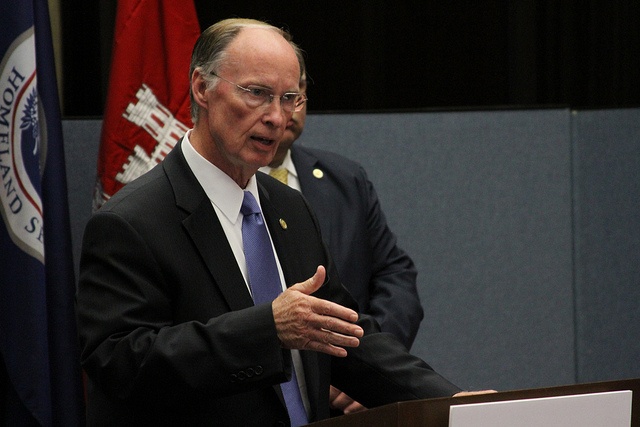Less money, more problems: Tax codes handcuff states facing budget crises

With his state facing a multimillion-dollar budget shortfall, Alabama Gov. Robert Bentley (R) has called for raising revenue, but he's hamstrung by a legislature hostile to taxes and by a regressive state tax system that takes more from lower-income residents than the wealthy. (Photo by Alabama EMA via Flickr.)
In his feisty State of the Union address this week, President Obama unveiled a populist tax plan targeting the wealthy, including increased rates on capital gains, closing a loophole for inherited investments, and creating a tax on banks with more than $50 billion in assets. The White House says the proposal would raise $320 billion over 10 years, enough to fund tax breaks for middle- and low-income earners.
Whatever the fate of Obama's plan -- GOP Congressional leaders have already declared it DOA -- the debate in Washington mirrors a debate over tax equity springing up in the states, including those in the South that are still facing troubling budget shortfalls.
Even as states slowly emerge from the Great Recession, the watchdog group State Budget Solutions estimated last month that 16 faced likely budget shortfalls in 2015. This grim economic forecast was echoed by the National Association of State Budget Officers, which predicts [pdf] state revenues in 2015, while rising slightly over last year, will still fall short of pre-recession levels.
What's worse, some of the states facing the most serious budget problems may be the least-equipped to address them, hamstrung by leaders adamantly opposed to new taxes and constrained by regressive tax systems that rely heavily on taxing still-struggling working-class families.
Consider Alabama. The state faces a shortfall of more than $250 million in 2015, despite a state constitutional amendment that requires a balanced budget. To comply with the law, state officials had been borrowing and shifting money in a way that has increased long-term liabilities, which could balloon to $700 million in coming years -- a fact that Gov. Robert Bentley (R) said he only happened to learn about the day after the 2014 elections.
Bentley campaigned on a "no new tax" platform and has signed the Taxpayer Protection Pledge pushed by the conservative Americans for Tax Reform, in which lawmakers promise to "oppose and veto any and all efforts to increase taxes." Bentley also faces a Republican-majority legislature that declared 2014 the year of "taxpayer relief."
As he was sworn into office this week, Bentley appeared to change course, declaring that "everything is on the table" and that Alabama "is going to be raising revenue." But when Bentley has floated specific proposals -- such as removing state deductions for federal taxes or FICA paycheck payments -- he has been bitterly opposed by state lawmakers and hammered by Americans for Tax Reform for violating his no-tax pledge.
WHO PAYS?
Alabama has a more basic problem: a regressive tax system that requires lower-income residents to pay a higher share of their income than wealthy families. A recent report by the Institution on Taxation and Economic Policy rates Alabama's state tax system as the 12th-most regressive in the country. Among the state's regressive features are a sales tax on groceries and narrow income tax brackets that force a majority to pay the top rate.
"Alabama's upside down tax system requires low and middle income households to pay twice the share of income in state and local taxes that the top 1 percent pay," according to the Alabama Arise Citizens' Policy Project, a statewide citizens group. "Tax breaks at the top starve public services of hundreds of millions of dollars a year and force low-income Alabamians to shoulder more of those services' costs."
Louisiana, which confronts an even more daunting $1.4 billion shortfall next year, is also hampered by political pressures and a regressive tax code. ITEP ranks Louisiana's system as the 19th-most regressive in the country. In addition to lingering effects of the recession, this year the energy-dependent state has been hit by falling oil prices. Taxes associated with the oil markets account for 13 percent of the state's general fund.
The result: massive proposed cuts, including up to $300 million from the state's universities and colleges. With 2015 being an election year for the state legislature -- and Gov. Bobby Jindal (R) term-limited out of office but expected to announce a presidential run for 2016 -- state Republicans have made it clear new taxes to raise revenue won't be happening.
Just because a state ranks higher in terms of tax fairness doesn't mean it won't head in a more regressive direction. In North Carolina, which ITEP says "has the 31st most unfair state and local tax system" nationally, the state's Fiscal Research Division just announced that revenues are $199 million below projections for the 2014-2015 fiscal year. That comes on top of an already-expected cost of more than $700 million for a tax-cut bill lawmakers passed in 2013 that disproportionately benefited the wealthy and corporations, according to the North Carolina Budget and Tax Center.
"The growing cost of the 2013 tax plan further challenges state lawmakers' ability to rebuild what was lost in the aftermath of the Great Recession and reposition itself to compete nationally and globally," says Tazra Mitchell of the N.C. Budget and Tax Center. "North Carolinians are already dealing with the fallout of the current state budget that falls short of what's needed for children, families, and communities to thrive."
Tags
Chris Kromm
Chris Kromm is executive director of the Institute for Southern Studies and publisher of the Institute's online magazine, Facing South.
